
Have inflation and the energy crisis had an impact on travel behaviour? Have guests cut back on comfort and travelled less? Are workation holidays an issue? DERTOUR's latest travel barometer provides answers to these and many other questions.
DERTOUR's colleagues have once again analysed the travel behaviour of their guests. This time, the DERTOUR Travel Barometer looked at winter holidays in the months of November 2022 to the end of February 2023 compared to the same period before the pandemic (November 2019 to the end of February 2020). The results show: "Inflation and the energy crisis did not lead to a low-cost boom," says Sven Schikarsky, Head of Product at DERTOUR and its sister brands ITS and Meiers Weltreisen. "On the contrary: winter holidaymakers placed particular value on comfort, quality and service. At the same time, they were looking for good value for money."
Are we travelling retro? 3 questions for Sven Schikarsky
 Sven Schikarsky, Head of Product at DERTOUR and its sister brands ITS and Meiers Weltreisen
Sven Schikarsky, Head of Product at DERTOUR and its sister brands ITS and Meiers Weltreisen
one: Mr Schikarsky, January was the month with the highest number of bookings ever recorded by DERTOUR. Whether the German Travel Association, the Research Association for Holidays and Travel (FUR) or other industry experts - everyone agrees: Germans have rediscovered travelling. Do you think this trend will continue?
Sven Schikarsky : The desire to go on holiday and travel is very high again. This was reflected in an extremely high number of bookings, particularly at the beginning of the year. This development certainly includes catch-up effects. We are also seeing that our guests want to treat themselves on holiday and value comfort and service. What is also clearly noticeable is the return of planning certainty. Those who book early still have a large selection of favourite hotels and room types. Many guests are also taking advantage of the large number of attractive early booking offers and family specials to ease the strain on their travel budget. I therefore assume that the trend from the past will continue and that our guests will continue to secure their dream holiday early.
one: The DERTOUR travel barometer shows a clear trend towards calculable all-inclusive holidays. Are Germans travelling retro? In recent years, the trend has tended to decline, but individuality and luxury have gained in importance.
Sven Schikarsky: Contrary to some preconceptions, all-inclusive is actually very individual, because no other catering option meets the personal needs of different holidaymakers better. The choice and temporal flexibility of all-inclusive offers are unbeatable. What's more, all-inclusive does not necessarily mean large buffet restaurants. There are many hotels where guests can also dine in a la carte restaurants and at a high culinary level as part of their AI. Many of our guests indulge themselves and appreciate the budget security. The comfort of not having to worry about any additional costs and instead being able to enjoy a carefree lunch by the pool, a snack or ice cream on the beach or a drink at sunset is also a form of luxury - not least in combination with the wide choice and time flexibility.
one: What is your forecast for the future? Will AI remain a big hit or is this a temporary development?
Sven Schikarsky : The trend towards all-inclusive holidays has been growing for several years now, and we can see that all-inclusive will continue to be booked more frequently for the coming summer. Many of our guests have come to know and appreciate the advantages and convenience of all-inclusive holidays in recent years. I therefore firmly believe that the all-inclusive trend will continue.
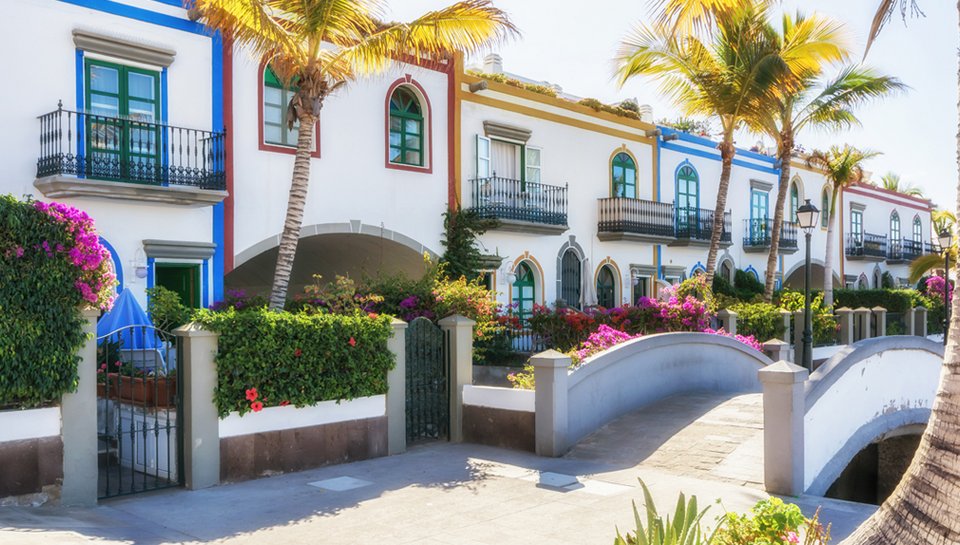
How we travel
The key findings of the DERTOUR Travel Barometer Winter 2022/2023:
January: Strongest booking month in DERTOUR's history
Overall, winter bookings for the 2022/2023 season started somewhat more cautiously than in 2019/2020. However, this changed significantly at the beginning of the new year: in January 2023, the strongest booking month DERTOUR has ever recorded, winter bookings were strong alongside the coming summer. "In January, the knot finally burst. Winter holiday bookings came in strongly and at short notice, while at the same time the enormous summer demand - driven by the attractive early booking discounts - led to significantly longer booking lead times again," explains Sven Schikarsky.
Sunshine instead of winter blues
In terms of winter holidays, there was a particularly high demand for sunny destinations and beach paradises. Among the ten most popular destinations for winter holidays, Germany and Poland were the only two destinations that are not beach destinations. These scored highly with wellness and/or skiing offers. The USA offers a little bit of everything in the winter months: beach destinations such as Hawaii or Florida, round trip destinations such as the south-west of the USA or California as well as skiing holidays in Vail or Aspen. Christmas shopping in winter also attracts many guests to New York.
At the top of the popularity scale was Spain with the Canary Islands, which are extremely popular in winter. This was followed by Germany, Egypt, the Caribbean with the Dominican Republic, Mexico & Cuba, Turkey, the Indian Ocean with the Maldives, Mauritius and the Seychelles, Thailand, the United Arab Emirates and Poland.
| The 10 most popular winter holiday destinations | |
|---|---|
| 1. Spain | 6. Indian Ocean (Maldives, Mauritius, Seychelles) |
| 2. Germany | 7. Thailand |
| 3. Egypt | 8. United Arab Emirates |
| 4. Caribbean (Dom Rep, Mexico, Cuba) | 9. USA |
| 5. Turkey | 10. Poland |
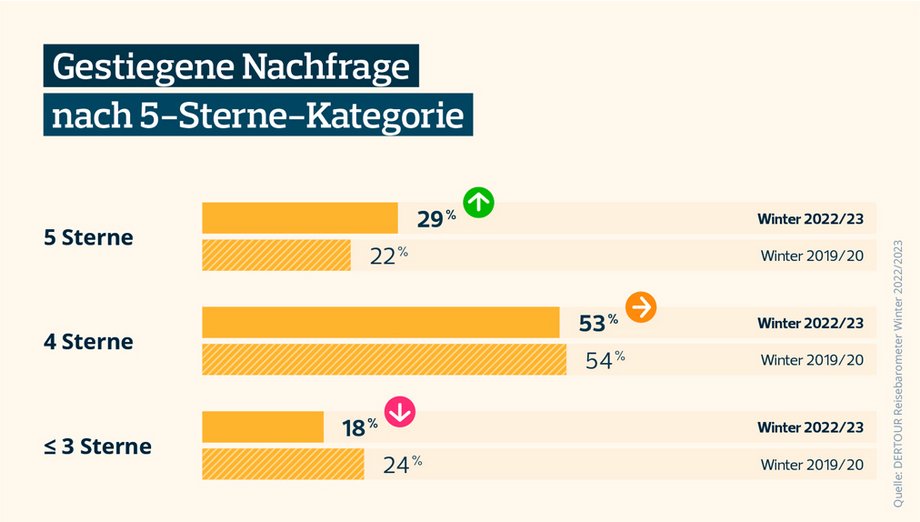
Last summer, hotel bookings had already shown an increased demand for higher star categories. This trend also continued for winter holidays: 82% of guests booked a 4- or 5-star hotel. This was 9 percentage points more than in summer 2022 and 6 percentage points more than in winter three years ago.
Almost a third of winter holidaymakers (29%) booked 5-star hotels. The proportion of 5-star bookings was therefore 8 percentage points higher than in summer 2022 and 7 percentage points higher than in the same period three years ago.
More than half of holidaymakers booked a 4-star hotel for their winter holiday. With a share of 53%, this category was the most popular. Demand remained largely unchanged compared to three years ago: Their share fell by just 1 percentage point in favour of the 5-star category.
"Inflation and the energy crisis did not lead to a low-cost boom," says Sven Schikarsky. "On the contrary: winter holidaymakers placed particular value on comfort, quality and service. At the same time, they were looking for good value for money."
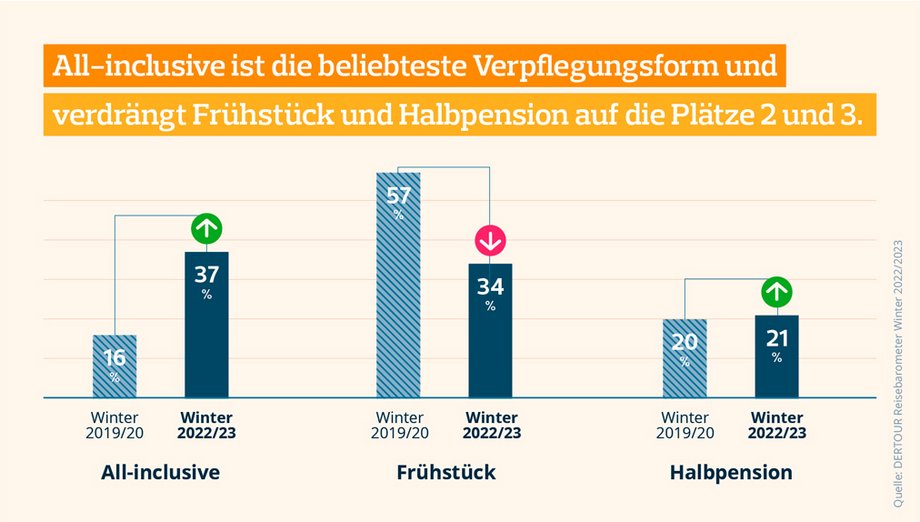
The fact that holidaymakers did not save money in winter per se, but placed value on budget security and enjoyment, is also reflected in the development of the various types of catering. All-inclusive, which was already in high demand last summer, continued on its successful course and was the most popular type of catering in winter. More than one in three (37%) booked AI. The proportion of AI bookings was therefore up by a whopping 21 percentage points compared to the same period three years ago and by 16 percentage points compared to summer 2022. "In view of the rising cost of living, guests are increasingly opting for predictability and cost control on their winter holidays. At the same time, they allowed themselves to enjoy a rich culinary offering to the full without having to worry about additional costs," explains Schikarsky.
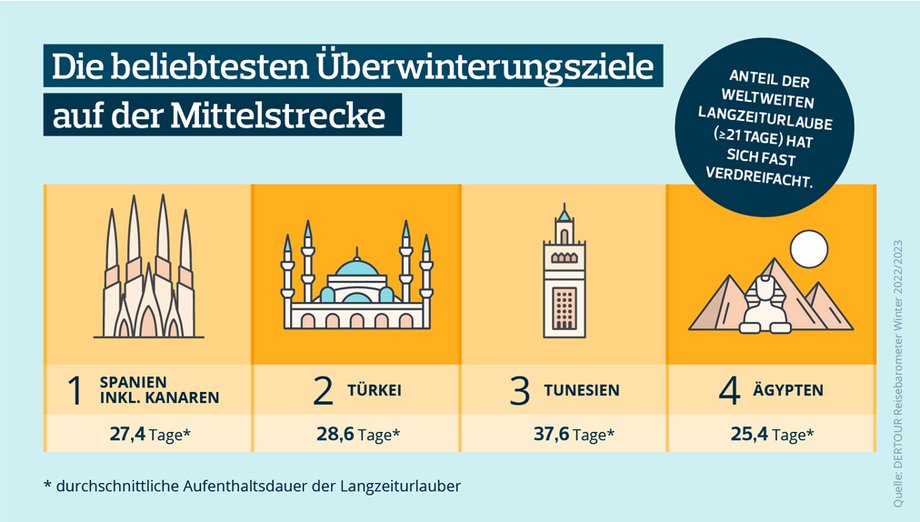
In winter 2022/2023, the popular medium-haul wintering destinations - in Spain, especially the Canary Islands, Turkey, Tunisia and Egypt - experienced a veritable boom in long-term holidays, with growth rates in the three- and even four-digit range.
"Long-term holidays were certainly also very popular due to the rise in energy costs and the increased opportunities to relocate the home office abroad for a certain period of time," says Sven Schikarsky. Added to this is the price appeal of long-term holidays: with special long-term benefits, you can save up to 30% on the normal holiday price, and if you book early, you can even save up to 40% with additional early booking discounts. "Escaping the cold and dreary winter weather and, in the best case, saving on heating costs and benefiting from low holiday and ancillary costs - that was a reason for many people to take a longer holiday in the sun."
Many hotels and apartment complexes are well prepared for long-term holidaymakers, especially on medium-haul routes. Many offer optional rooms without meals or all-inclusive with attractive long-term advantage prices as well as good office equipment for working holidays. A varied sports and entertainment programme and good health care are also important for long-term holidaymakers. For this reason, many hotels in popular long-term holiday destinations work closely with local German-speaking doctors.
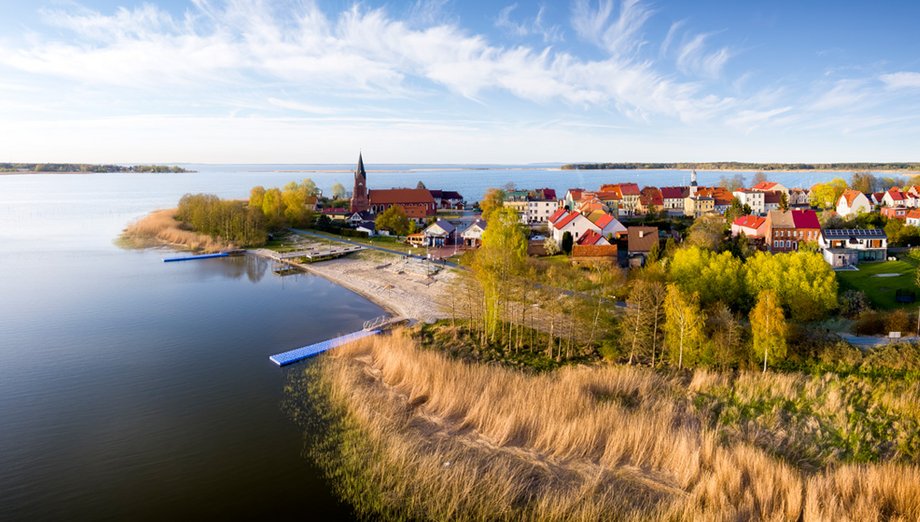 Aerial view of Nowe Warpno on the Szczecin Lagoon (photo credit: ewg3D - iStock/Getty Images)
Aerial view of Nowe Warpno on the Szczecin Lagoon (photo credit: ewg3D - iStock/Getty Images)
Wintertime is wellness time. Traditionally, many people use the cold season to do something good for their health with spa and wellness holidays, to recharge their batteries and take a little time out in between. Many people enjoy winter by the sea, but holidays in the German low mountain ranges and in the traditional Czech spas and health resorts in the Bohemian spa triangle are also very popular.
The five most popular wellness destinations in winter 2022/22023 were Germany, Poland, the Czech Republic, Austria and Spain. Germany remains in first place on the popularity scale, albeit with a significant decline compared to 2019/2020: 43% of guests spent their wellness holidays in Germany in the winter months of 2022/2023. Three years ago, the figure was 75%. Germany is losing wellness holidaymakers to two destinations in particular: the Polish Baltic Sea, this winter's boom destination among wellness destinations, and the Czech Republic.
The development of the Polish Baltic Sea as a wellness region is impressive: the proportion of wellness holidays there has risen by 22 percentage points this winter: A total of 30 % of all wellness holidaymakers spent their feel-good time-out at the Polish Baltic Sea. Three years ago, the figure was just 8%. At the same time, demand has almost doubled with an increase of 95%.
The Czech Republic also recorded strong growth, with demand for wellness holidays increasing by 45% compared to three years ago. In the winter months of 2019/2020, 5% of all wellness holidays took place in the Czech Republic. This winter, the figure was 13%.
"This winter, our guests primarily discovered spa and wellness destinations with a particularly attractive price-performance ratio," explains Sven Schikarsky. In this segment, too, it is clear that holidaymakers have not made fundamental savings, but rather have placed great value on service and value for money: "The wellness hotels on the Polish Baltic coast and in the Czech spas and health resorts such as Karlovy Vary, Mariánské Lázně and Františkovy Lázně are very well equipped. Some are newly built and many have been renovated or modernised in recent years. They offer a very high standard of quality and service at extremely attractive prices. Especially compared to other spa and bathing resorts, the Polish destinations offer a clear price advantage," says Schikarsky.
| The 5 most popular wellness destinations | |
|---|---|
| 1. Germany, Austria | 4. Austria |
| 2. Poland | 5. Spain |
| 3. Czech Republic | |
About the DERTOUR travel barometer
The evaluation is based on bookings with DERTOUR and its sister brands Jahn Reisen, ITS, Meiers Weltreisen and Travelix with travel dates in the period from 1 November 2022 to 28 February 2023 compared to bookings with travel dates in the period from 1 November 2019 to 29 February 2019 as of 23 February 2023 or 21 February 2020.
